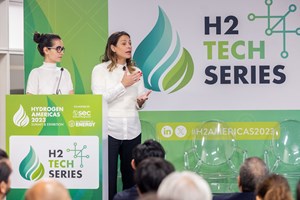News
Exploring Brazil's H2 potential: ABH2's contribution to H2 safety, standards and information dissemination
Story by: Tyler Campbell, Managing Editor
The Sustainable Energy Council (SEC) and the U.S. Department of Energy (DOE) hosted the second Hydrogen Americas Summit in Washington DC (United States). The H2 Tech Series technical presentations featured Marina Domingues, Director of Market and Regulations for the Brazilian Hydrogen Association (ABH2), and Danielle Vallois, Director of Institutional Relations for the ABH2’s presentation titled “The role of certification in defining Brazil’s hydrogen (H2) strategy.”
Domingues began her presentation with an overview of ABH2. ABH2 is working on developing the H2 network, contributing H2-related safety codes and standards, producing and disseminating information and much more. Brazil boasts several resources for H2 production, such as access to hydropower, natural gas, biogas, natural H2, solar, wind and ocean energy. Brazil also has policies in place for carbon credits in the transportation market, renewable energy expansion (solar and wind) incentives and biofuels.
According to Domingues, the country is 85% decarbonized without reliance on H2. She showed a chart for the potential of industry creation, highlighting the significant areas for H2 utilization in Brazil. The most prominent use is fertilizer (ammonia), currently 80%–95% imported into Brazil, followed by H2 use in refineries, which is projected to decrease over time. However, steel production and road transport show a large potential for growth in the country.
The Brazilian government developed a H2 program (Triannual H2 program), part of a discussion focused on exploring the country’s decarbonization capability, aiming to have at least one H2 pilot plant in every state by 2025, become H2 competitive by 2030 and develop H2 hubs by 2035. This strategy is frequently updated.
“We have created a legal committee that will collaborate with the key players to support the advocacy of policy in Brazil,” Vallois said. “The current president of Petrobras was a senator and author of the bills of law that deal with the main topics of the energy transition, including green H2 and carbon capture. Now that he has taken office at Petrobras, the strategy at the company accelerated, and from my personal view, the national oil companies (NOCs) will drive the energy transition.”
Regarding regulations for the H2 market, there are three categories on the international level that must be considered: global decarbonization issues, technology adaptability and international trade. This leads to challenges such as agreements on norms and standards, certifications and carbon dioxide (CO2) accounting; Brazil partners with the International Organization for Standardization (ISO), Chamber of Electricity (CCEE) and International Partnership for Hydrogen and Fuel Cells in the Economy (IPHE) respectively to address these challenges.
Domingues ended the presentation by showing the current major players in Brazil’s H2 market. A few notable companies include Shell, Engie, Total Eren, Yara, thyssenkrupp nucera and Statkraft, all with H2 projects in development.


